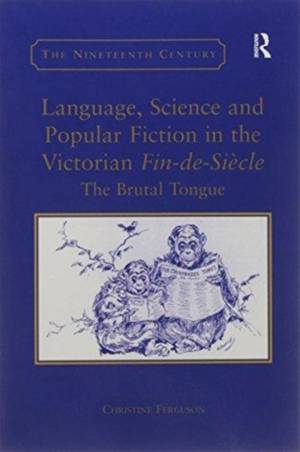
- Afhalen na 1 uur in een winkel met voorraad
- Gratis thuislevering in België vanaf € 30
- Ruim aanbod met 7 miljoen producten
- Afhalen na 1 uur in een winkel met voorraad
- Gratis thuislevering in België vanaf € 30
- Ruim aanbod met 7 miljoen producten
Zoeken
Language, Science and Popular Fiction in the Victorian Fin-de-Siècle
The Brutal Tongue
Christine Ferguson
€ 106,95
+ 213 punten
Uitvoering
Omschrijving
Christine Ferguson's timely study is the first comprehensive examination of the importance of language in forming a crucial nexus among popular fiction, biology, and philology at the Victorian fin-de-siècle. Ferguson demonstrates how Darwinian accounts of 'primitive' and animal language were co-opted into wider cultural debates about the apparent brutality of popular fiction, and shows how popular novelists used their fantastic narratives to radically reformulate the relationships among language, thought, and progress that underwrote much of the contemporary prejudice against mass literary taste.
Specificaties
Betrokkenen
- Auteur(s):
- Uitgeverij:
Inhoud
- Aantal bladzijden:
- 190
- Taal:
- Engels
- Reeks:
Eigenschappen
- Productcode (EAN):
- 9781138262805
- Verschijningsdatum:
- 19/10/2016
- Uitvoering:
- Paperback
- Formaat:
- Trade paperback (VS)
- Afmetingen:
- 156 mm x 234 mm
- Gewicht:
- 276 g

Alleen bij Standaard Boekhandel
+ 213 punten op je klantenkaart van Standaard Boekhandel
Beoordelingen
We publiceren alleen reviews die voldoen aan de voorwaarden voor reviews. Bekijk onze voorwaarden voor reviews.











